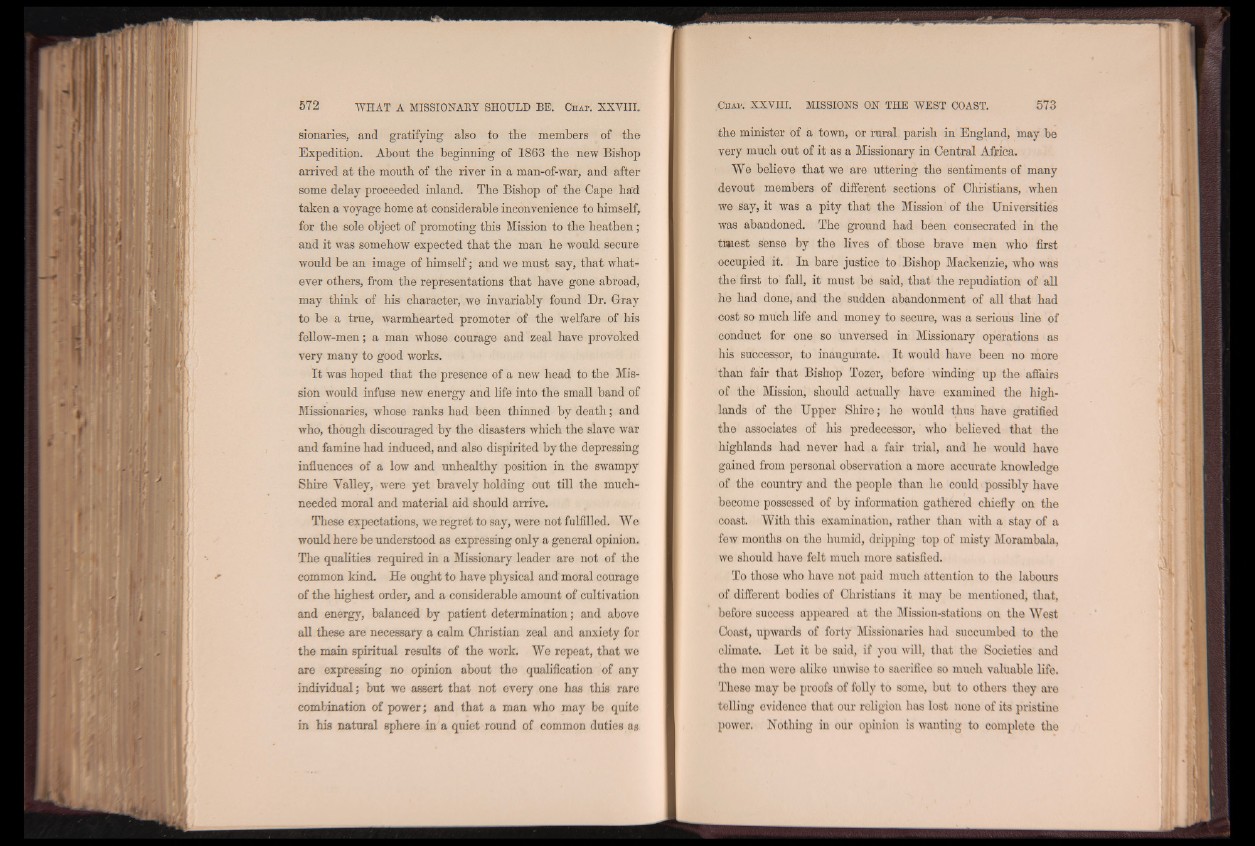
sionaries, and gratifying also to the members of the
Expedition. About the beginning of 1863 the new Bishop
arrived at the mouth of the river in a man-of-war, and after
some delay proceeded inland. The Bishop of the Cape ha’d
taken a voyage home at considerable inconvenience to himself,
for the sole object of promoting this Mission to the heathen;
and it was somehow expected that the man he would secure
would be an image of himself; and we must say, that whatever
others, from the representations that have gone abroad,
may think of his character, we invariably found Dr. Gray
to be a true, warmhearted promoter of the welfare of his
fellow-men; a man whose courage and zeal have provoked
very many to good works.
I t was hoped that the presence of a new head to the Mission
would infuse new energy and life into the small band of
Missionaries, whose ranks had been thinned by death; and
who, though discouraged by the disasters which the slave war
and famine had induced, and also dispirited by the depressing
influences of a low and unhealthy position in the swampy
Shire Valley, were yet bravely holding out till the much-
needed moral and material aid should arrive.
These expectations, we regret to say, were not fulfilled. We
would here be understood as expressing only a general opinion.
The qualities required in a Missionary leader are not of the
common kind. He ought to have physical and moral courago
of the highest order, and a considerable amount of cultivation
and energy, balanced by patient determination; and above
all these are necessary a calm Christian zeal and anxiety for
the main spiritual results of the work. We repeat, that we
are expressing no opinion about the qualification of any
individual; but we assert that not every one has this raro
combination of power; and that a man who may be quite
in his natural sphere in a quiet round of common duties as
the minister of a town, or rural parish in England, may be
very much out of it as a Missionary in Central Africa.
We believe that we are uttering the sentiments of many
devout members of different sections of Christians, when
we say, it was a pity that the Mission of the Universities
was abandoned. The ground had been consecrated in the
truest sense by the lives of those brave men who first
occupied it. In bare justice to Bishop Mackenzie, who was
the first to fall, it must be said, that the repudiation of all
he had done, and the sudden abandonment of all that had
cost so much life and money to secure, was a serious line of
conduct for one so unversed in Missionary operations as
his successor, to inaugurate. It would have been no more
than fair that Bishop Tozer, before winding up the affairs
of the Mission, should actually have examined the highlands
of the Upper Shire; he would thus have gratified
the associates of his predecessor, who believed that the
highlands had never had a fair trial, and he would have
gained from personal observation a more accurate knowledge
of the country and the people than he could possibly have
become possessed of by information gathered chiefly on the
coast. With this examination, rather than with a stay of a
few months on the humid, dripping top of misty Morambala,
we should have felt much more satisfied.
To those who have not paid much attention to the labours
of different bodies of Christians it may be mentioned, that,
before success appeared at the Mission-stations on the West
Coast, upwards of forty Missionaries had succumbed to the
climate. Let it be said, if you will, that the Societies and
the men were alike unwise to sacrifice so much valuable life.
These may be proofs of folly to some, but to others they are
telling evidence that our religion has lost none of its pristine
power. Nothing in our opinion is wanting to complete the